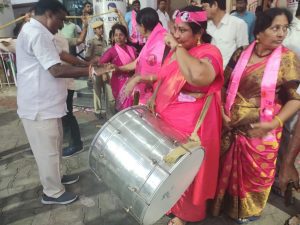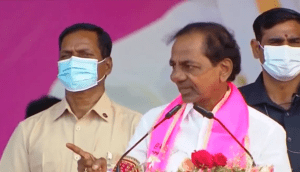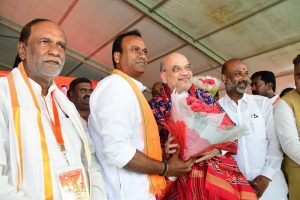The BJP could win or put up a strong show only by importing powerful leaders from other parties. It is not so easy for the party to find strong candidates in all the 119 Assembly seats in a general election.

TRS workers celebrate the Munugode bypoll victory at the party headquarters in Banjara Hills, Hyderabad, on 6 November (Ajay Tomar/South First)
Close on the heels of losing Dubbak and Huzurabad to the BJP, the TRS wrested the Munugode seat in a prestigious Telangana by-election that saw a no-holds-barred contest.
In the most expensive election ever fought, the TRS won this seat with a comfortable margin of over 10,000 votes, but not without experiencing many an anxious moment.
This win is significant for the pink party as it comes immediately after the regional outfit declared its intention to transform itself into a national party called Bharata Rashtra Samithi (BRS).
Though the TRS won two of the four bypolls held since the 2018 Assembly elections (Huzurnagar and Nagarjunasagar), the saffron party — capitalising on its nail-biting win in Dubbak and a spectacular show in Huzurabad and the Hyderabad municipal polls — has been peddling a narrative that it is all set to trounce the TRS in the upcoming Assembly elections in 2023.
The BJP even claimed that the countdown for the KCR regime in Telangana has begun. This narrative got major resistance as the TRS won in Munugode. It is much more important when seen in the backdrop of the TRS losing the Munugode seat in 2018 to the then Congress nominee Komatireddy Rajagopal Reddy, who now contested as a BJP candidate after he resigned post-defection, necessitating the bypoll.

TRS workers celebrate the Munugode bypoll victory at the party headquarters in Banjara Hills, Hyderabad, on 6 November (Ajay Tomar/South First)
The TRS has maintained an over 40% vote share indicating the formidable position it still enjoys in the Telangana electoral battlefield despite discontent brewing in certain sections. The plethora of welfare schemes has immensely benefitted the ruling TRS.
However, the tough fight the TRS faced from the BJP in Munugode reveals the limits of welfarism in winning elections. The BJP could attract a significant chunk of young voters in Munugode, indicating the possible pitfall for the TRS in 2023 if it fails to make a course correction.
Despite losing the prestigious battle, the BJP can console itself with the fact that it proved to be a principal challenger to the TRS, relegating the Congress to the back seat.
The Congress won Munugode in 2018. Rajagopal Reddy, who won as a Congress nominee, then joined the BJP and resigned from his Assembly seat. It was the BJP’s risky strategy to invite by-elections aimed at proving a point that it is making the TRS run for votes.
The BJP game plan boomeranged in Munugode as KCR planned a clever strategy to upset the saffron applecart. Realising the vote deficit the TRS suffers from in this seat which it won only in 2014, KCR allied with the Left with remarkable alacrity.

Telangana Chief Minister and TRS supremo K Chandrasekhar Rao (KCR) addresses a meeting in Munugode before the bypoll (Twitter/@trspartyonline)
Munugode falls in the undivided Nalgonda district that was once a communist bastion. Despite a strong erosion in their support base, the Left parties still enjoy a considerable strength sufficient enough to influence the direction of the mandate. The Left saw in TRS a force to stall the saffron surge.
The victory margin reveals how the bonhomie of the TRS with the Left proved to be so indispensable at the hustings.
The Munugode mandate is in a sense a Congress story. The grand old party was decimated in the Huzurabad bypoll facilitating the BJP’s win as it rallied the entire anti-government vote. Similarly, in Dubbak, the poor show of the Congress helped the BJP to get all the anti-establishment votes, resulting in a victory with a hairline margin.
In Munugode, though it lost the deposit, the Congress could still get over 23,000 votes. Any further erosion in the Congress vote share would have adversely impacted the TRS fortunes.
The BJP was hoping for this especially as its Munugode candidate was a turncoat from the Congress.
Munugode was a traditional Congress stronghold. The Komatireddy brothers headed a powerful group within the grand old party. The candidate’s brother Komatireddy Venkat Reddy is a Congress Lok Sabha member from Bhuvanagiri. Venkat Reddy not only refrained from campaigning for the Congress in Munugode but has even clandestinely promoted his brother Rajagopal Reddy of the BJP.
But the Munugode Congress always had another group hostile to the Komatireddy brothers. Thus, Rajagopal Reddy could not take away the Congress vote lock, stock, and barrel.
The TRS could get an advantage in the triangular contest, forecasting the things to come in 2023. The Bahujan Samaj Party (BSP), whose state unit is now led by a former IPS officer, RS Praveen Kumar, failed to convert the goodwill it generated among the Dalit masses during the campaign trail into voting.
The BJP is hoping for an influx of leaders into it from both the Congress and the ruling TRS in the run-up to the 2023 Assembly elections.
This was the strategy that the BJP adopted in West Bengal, which was hitherto unfamiliar terrain for saffron politics. The BJP lured a large number of Trinamool Congress MLAs, creating a perception that it alone can dethrone Mamata Banerjee’s regime. In the process, the Left and the Congress got squeezed as the electoral battle was polarised between the Trinamool Congress and the BJP.
The BJP was preparing for a similar perception war to ensure that it could attract the entire anti-incumbency vote. The alleged operation to buy four TRS MLAs is reportedly part of this strategy. The Munugode mandate has certainly put a halt to the saffron narrative, though no one knows whether it will be a temporary one or not.

BJP leader and Union Home Minister Amit Shah welcoming former Congress MLA Komatireddy Rajagopal Reddy to the party at a rally in Munugode (Twitter/BJP Telangana)
It was a blessing in disguise for the BJP though it lost the Munugode bypoll. The party could at least prove the point that it is a principal challenger for the TRS. It hopes to emerge as the natural choice for those who wish to defeat KCR. However, the BJP cannot digest the fact that Rajagopal Reddy, who won as a Congress nominee with a comfortable margin in 2018, has now lost as its nominee.
The trajectory of bypoll results after 2018 decisively proves the saffron party’s vulnerability. The BJP could either win or put up a strong show as in Munugode only when it could import powerful leaders from other parties. It is not so easy for the party to find strong candidates in all the 119 Assembly seats in a general election.
The BJP accuses the TRS of indulging in poll management. But ground reports from Munugode reveal that the BJP matched the TRS in every aspect of the so-called poll management, a euphemistic phrase for the use of money and liquor to get votes. The bypoll mandate would only end up making Telangana politics much more acrimonious.
(K Nageshwar is a political analyst and professor of journalism at Osmania University. He is a former member of the Legislative Council, both in united Andhra Pradesh and Telangana. He has worked as an editor in print and electronic media. These are the personal views of the author)

Jul 26, 2024

Jul 26, 2024

Jul 26, 2024

Jul 25, 2024

Jul 25, 2024

Jul 25, 2024